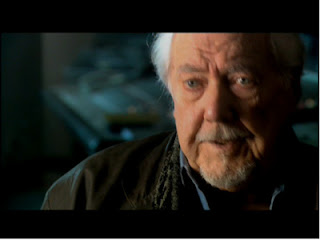1. Orson Welles—I believe that a work is good to the the degree that it expresses the [artist] who created it.
2. Robert Altman re: "M*A*S*H"—All we have to do is stay hidden, not go over budget, don't do anything to draw attention to ourselves, keep our mouths shut and make our picture.
3. Sydney Pollack re: "M*A*S*H"—…who wasn't afraid? How were these guys not afraid because until that time there was something sacred about that, this was a war, the United States was at war, you don't poke fun at this stuff.
4. Julie Christie re: Robert Altman—By breaking the rules he created a sort of template for so many things that came after, like subversion of genre.
5. Robert Altman—I don't tell stories. Stories don't interest me. There's only about six stories. Basically I'm more interested in behavior. What it is simply is I want to see something onscreen that I've never seen before.
6. John Calley (former Warner Bros. executive)—Having been a producer, I felt the balance of power should shift to the director. I felt that it was inherently a director's medium, that the most exciting filmwork was being done by those filmmakers who had control like Fellini and Visconti…Felt that they [filmmakers] didn't need producers to be parental towards them.
7. Marshall Brickman (writer) re: Woody Allen—[Allen] used to always say, if you act like an artist, they'll treat you like an artist.
8. Clint Eastwood re: Michael Cimino's script for "Thunderbolt and Lightfoot"—What kind of mind is writing this? This guy is bizarre but fun. Bizarre is great as long as you're having fun. The relationships [among the characters] was great, too.
9. Paul Mazursky—My feeling was, there's nothing we couldn't do, there's nothing we couldn't try.
10. Robert Towne—The idea of barriers being broken and the promise of being able to do whatever you could imagine was very exciting. There was a sense of a new freedom and it was up to you to have the imagination to push it wherever and however far you could.
11. Sidney Lumet re: Dog Day Afternoon—I said to the cast, the only way I know of avoiding any sensationalism and any sense of exploitation is if you make this so much your own that they see nothing but human beings up there. The humanity of it will stop any sense of outrageousness [of the audience towards the gay characters.]
12. Ellen Burstyn re: Bob Rafelson's casting in "The King of Marvin Gardens"—That's kind of typical of the attitude of the time, of Bob Rafelson, of BBS, which was this is the conventional or the expected thing to do, let's flip it and do it the opposite.

